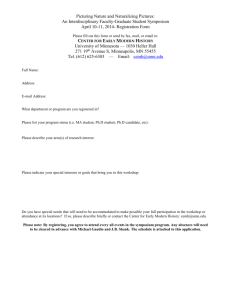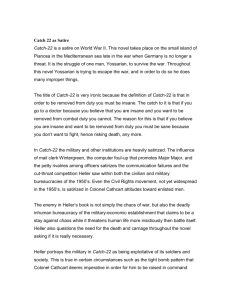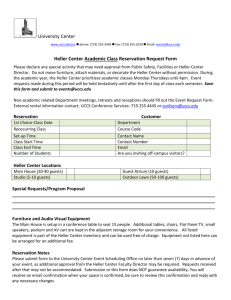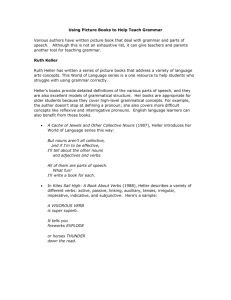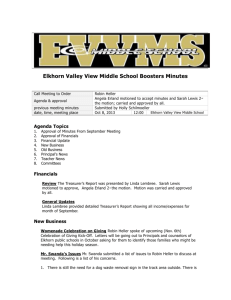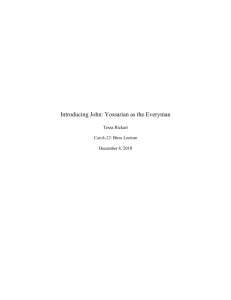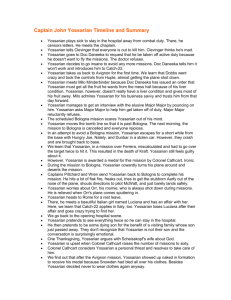Stylistic Linguistic..
advertisement
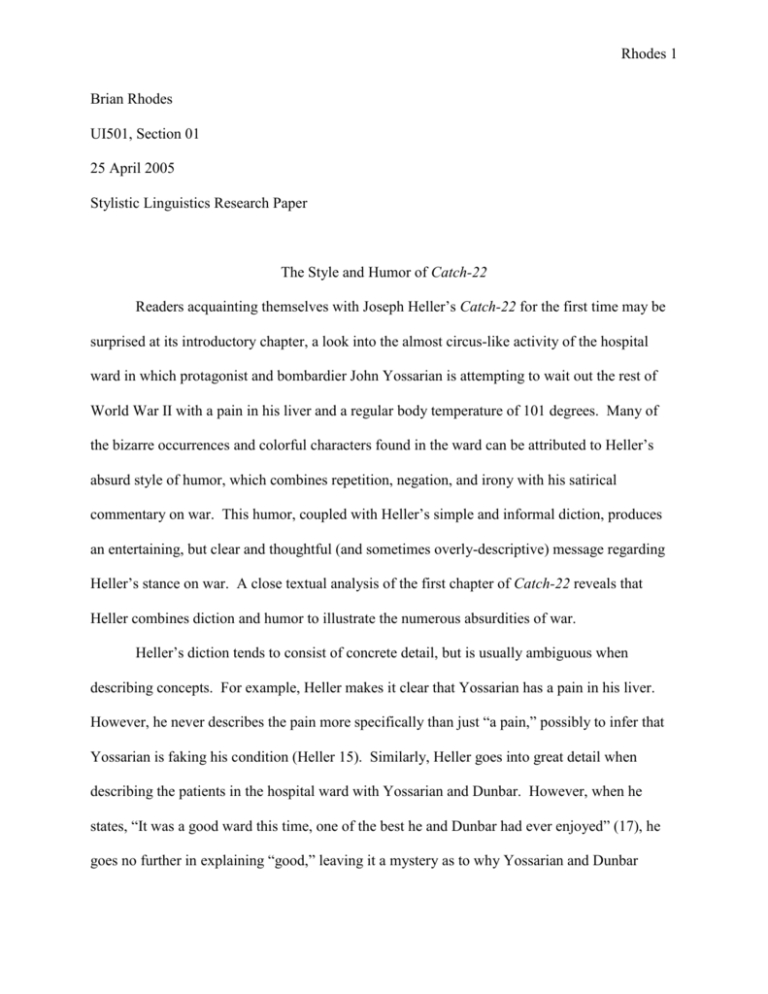
Rhodes 1 Brian Rhodes UI501, Section 01 25 April 2005 Stylistic Linguistics Research Paper The Style and Humor of Catch-22 Readers acquainting themselves with Joseph Heller’s Catch-22 for the first time may be surprised at its introductory chapter, a look into the almost circus-like activity of the hospital ward in which protagonist and bombardier John Yossarian is attempting to wait out the rest of World War II with a pain in his liver and a regular body temperature of 101 degrees. Many of the bizarre occurrences and colorful characters found in the ward can be attributed to Heller’s absurd style of humor, which combines repetition, negation, and irony with his satirical commentary on war. This humor, coupled with Heller’s simple and informal diction, produces an entertaining, but clear and thoughtful (and sometimes overly-descriptive) message regarding Heller’s stance on war. A close textual analysis of the first chapter of Catch-22 reveals that Heller combines diction and humor to illustrate the numerous absurdities of war. Heller’s diction tends to consist of concrete detail, but is usually ambiguous when describing concepts. For example, Heller makes it clear that Yossarian has a pain in his liver. However, he never describes the pain more specifically than just “a pain,” possibly to infer that Yossarian is faking his condition (Heller 15). Similarly, Heller goes into great detail when describing the patients in the hospital ward with Yossarian and Dunbar. However, when he states, “It was a good ward this time, one of the best he and Dunbar had ever enjoyed” (17), he goes no further in explaining “good,” leaving it a mystery as to why Yossarian and Dunbar Rhodes 2 enjoyed it so much. Again, when Yossarian stops playing chess with the artillery captain, the reader is told it is because “the games were so interesting they were foolish,” with the reason why the games were foolish left open for the reader to define, specifically. In these cases, Heller uses ambiguity to illustrate several negative aspects of the war. Yossarian uses the “pain” in his liver, for instance, to take advantage of bureaucratic policy regarding the health of officers—“If it became jaundice they could treat it. If it didn’t become jaundice and went away they could discharge him. But this just being short of jaundice all the time confused them” (15). Yossarian’s lingering pain wasn’t enough to be treated, but too concerning to allow for a discharge, in essence a telling example of Heller’s commentary on the incompetence of bureaucracy, made evident by how Yossarian takes advantage of it to avoid combat. “Nothing, after all, unsettles rigid bureaucratic minds more than an aberration lodging stubbornly between the cracks and just beyond the grip of rules. Yossarian's near-jaundice is a tiny but telling example. He spends as much time as possible in the hospital…mostly because there he is safe” (Pinsker, “Reassessing”). Likewise, while Heller doesn’t go into detail as to why the ward is good or why Yossarian and Dunbar enjoy themselves there, clearly spending time in the ward is a pleasant alternative to combat duty, and clearly Yossarian and Dunbar have taken advantage of hospital stays before. Finally, the simply-described foolishness of the chess games allows for a subtle parallelism of the foolishness of war—the more interesting the games, the longer and more pointless the games become. Additionally, Heller keeps his diction informal and monosyllabic, with mostly common words aside from some brief military jargon in order to present a clear and simple message regarding all of the regular guys like Yossarian caught up in such a tremendous conflict. Despite Rhodes 3 the stream-of-consciousness style Heller often uses, it remains easy to read his small and simple words. For example, in the line “They all knew he was a C.I.D. man because he kept inquiring about an officer named Irving or Washington and because after his first day there he wouldn’t censor letters,” the only word that breaks up the clarity of the sentence is “C.I.D.” (Heller 16), if the reader doesn’t know what that means. Virtually all of the dialogue is direct and simple, as well—to the point and totally devoid of wordiness. “Who gives a shit?” (17), for instance, is the only line of the ill warrant officer on Yossarian’s left, but the line reflects the brevity of much of the dialogue throughout the chapter. The simple diction of Heller and the simple dialogue of his characters reflect a sort of everyman mentality in narrating the story of Yossarian as he struggles with the military bureaucracy and his own objections to being shot at by the nameless, numberless, overwhelming “they” he makes mention of so many times throughout the novel. However, while Heller’s words may be simple, the sentences comprised by his diction vary greatly, in a way simulating the chaos of war and, in the case of the longer sentences, overload the reader with large amounts of supplementary information that illustrate the complications and complexities of war. The longest sentence of the chapter is 98 words, while the shortest sentence is only 2 words (though it is dialogue). The average sentence length of the chapter is approximately 13 words. As previously mentioned, character dialogue is always brief, usually less than five words per phrase, and any statements of fact are direct. For example, “In three days no one could stand him” is Heller’s brief statement that nobody in the ward liked the Texan (17). However, Heller’s descriptions result in longer sentences, but the longer sentences are often flanked by one or two short sentences that introduce or summarize a description, often with humorous effect, as will be explored later. For instance, the long description of the C.I.D. Rhodes 4 man is followed simply by “He found them too monotonous” (16), referring to why he wouldn’t censor letters. Furthermore, Heller’s diverse sentence choice varies from a few simple sentences to the more abundant compound, complex, and compound-complex sentences. “Yossarian sighed” is the simplest of Heller’s sentences (20), but most are more complicated. Heller is a master of the periodic sentence, frequently adding background information or describing the events leading up to the main point. For instance, “After he made up his mind to spend the rest of the war in the hospital, Yossarian wrote letters to everyone he knew saying that he was in the hospital but never mentioning why” is one of Heller’s many periodic sentences—it explains Yossarian has decided to stay in the hospital before it reaches the main point that he wrote letters to everyone he knew (16). The use of periodic sentences complements Heller’s depictions of the complications of war in that his longer sentences and descriptions are never to the point, always including supplementary information before introducing what is important. Pinsker compares the style of Heller to that of comedian Lenny Bruce, in which “Oceans of words washed across their respective audiences, overwhelming whatever objections to the material they might have had…while Heller engaged in a nonstop war against, well, war” (“Reassessing”). In addition to his keen use of diction, Heller’s use of humor throughout the first chapter of Catch-22 (and throughout the rest of the work, as well) makes for an absurdly funny novel and plays a huge role in the author’s satirical commentary on war. Heller makes use of a mild amount of slapstick, but he particularly favors repetition, negation, and irony, all of which appear in large quantities in the first chapter, oftentimes overlapping each other. Each humorous situation in some way relates to the message of the absurdity of war Heller conveys throughout the novel. Rhodes 5 Heller’s use of strictly slapstick, goofy comedy is used sparsely in the first chapter primarily to establish the element of humor in the novel, as well as to establish Yossarian as an unorthodox and entertaining character. For example, the novel’s opening lines, “It was love at first sight. The first time Yossarian saw the chaplain he fell madly in love with him” (15), immediately introduces the comedic element to the novel. “That Catch-22 engages in broad comedy is readily apparent from its first chapter, indeed its very first sentence” (Green, “Black Humor”). However, this line is mostly present for the sake of humor and starting the audience off with a laugh, as it has little bearing on the remainder of the novel besides introducing Yossarian’s fondness for the chaplain. Similarly, the games Yossarian plays with himself while censoring letters add to his bizarre and idiosyncratic nature, as he goes so far as blacking out “all but the salutation ‘Dear Mary’ from a letter, and at the bottom he wrote, ‘I yearn for you tragically. A. T. Tappman, Chaplain, U.S. Army’” (Heller 16). However, Heller makes use of a huge amount of repetition in numerous different styles. One such use of repetition is in what Roger H. Smith calls “echolalia,” a device commonly used in minstrel shows (Smith 26). Smith believes the following echolalian exchange between Yossarian and the chaplain to be pointless: “You’re a chaplain,” he exclaimed ecstatically. “I didn’t know you were a chaplain.” “Why yes,” the chaplain answered. “Didn’t you know I was a chaplain?” “Why, no. I didn’t know you were a chaplain” (Heller 21). However, when combined with the entire conversation between the two, in which the nervous chaplain responds to Yossarian’s remarks with “That’s good” or “That’s too bad” on numerous Rhodes 6 occasions, to which Yossarian consistently responds with either “Yes, that is good” or “Yes, that is too bad” (19-21), this use of repetition not only creates a humorous exchange, but also illustrates the far-reaching effects of the war. Yossarian and the chaplain have never met before, as made evident by their unfamiliarity with each other and their awkward and repetitive backand-forthing, but their places in the war have brought these two different individuals together in the depressing and uninviting environment of a hospital ward, illustrating the great effect the war had even on an individual level. Likewise, Heller uses repetition to describe the “vortex of specialists” trying to help the beleaguered colonel suffering in the hospital ward, citing “a urologist for his urine, a lymphologist for his lymph, an endocrinologist for his endocrines” (23), and so on. The repetition continues to a point where “one almost waits for the rimshots at the end of such a performance (it has the feel in particular of a more verbally playful Woody Allen joke)” and may lead to the impression that the “ultimate effect of humor such as this may be to contribute to the novel's overall sense of absurdity” (Green, “Black Humor”), even this lengthy chain of repetition contributes to Heller’s absurdity of war in that it displays gross micromanagement of a highranking officer. While the other patients in the ward lie around with minimal assistance from the hospital staff, the ill colonel receives a constant flurry of attention from every imaginable specialist when their time could probably be better spent attempting to help as many injured and ill personnel as possible, rather than focusing on one man, despite his rank. Additionally, negation becomes another frequently-used element of Heller’s humor that can be broken down into numerous forms. Much of Heller’s use of negation can be found in what Laura Hidalgo Downing calls reversals, “a negative proposition which defeats an expectation expressed…in previous discourse and which (a.) forms part of a contradictory Rhodes 7 structure, (b.) modifies assumed cultural patterns of experience, and (c.) creates a humorous effect” (“Negation”). These reversals are found in many of the novel’s self-contradictory statements made with humorous results. The line “The Texan turned out to be good-natured, generous and likable. In three days no one could stand him” (Heller 17) is an example of a reversal in that the reader’s initial impression of the Texan is a positive one, but the negative statement at the end of the line contradicts that first impression ironically in that the reader might not expect a good-natured and likable person to become so disliked so quickly, producing a surprising and humorous effect. This example of negation displays the diverse peoples and viewpoints intermingled in the war effort. The Texan’s good nature may be one of his finer qualities, but his highly-vocalized opinions are not necessarily shared by the other patients in the ward, creating tension and contributing to Heller’s chaotic war satire In addition to reversals, Heller’s constant use of simple negation in properly-timed situations also produces humor. For example, Yossarian finally admits to the chaplain, “I have everything I need and I’m quite comfortable. In fact, I’m not even sick” (21). Such a negation produces a humorous effect in that the chaplain has devoted much of his time to seeing what he can do to help the apparently ill Yossarian, but with one frank and well-timed negation on the part of Yossarian, he finds out his effort was for naught (albeit he is relieved Yossarian is well). This case of Heller’s negation further establishes Yossarian’s idiosyncratic nature, as he earlier rattled off his symptoms to the chaplain, but upon befriending him, opens up and admits he is not even sick, a sign that he finds comfort and safety in the presence of the chaplain. Finally, the last of the major elements of Heller’s humor is irony, which often comes as a result of negation. The previously-explored statement about the Texan, for instance, is irony as a result of negation. However, other ironies can be found, often in the form of what Smith calls Rhodes 8 “snappers,” in which extended statements such as “a review of intellectual attainments” or “a list of virtuous traits” end with a brief and ironic remark (26). Two examples of snappers can be found relating to the C.I.D. man. In the first instance, Heller describes how the C.I.D. man poses as a patient in the ward to get to the bottom of the censoring irregularities caused by the games Yossarian plays as he censors letters, but the patients see through the ruse because the C.I.D. man refuses to censor letters. Heller ends the description with the brief statement, “He found them too monotonous” (Heller 16). This snapper is ironic in that the C.I.D. man infiltrates the ward to solve the censoring mystery, but ends up contributing to the censorship dilemma in that he won’t censor any letters himself. This again supports Heller’s satirical theme of the absurdity of war because it portrays a military authority figure as incompetent and irresponsible, much in the same way Heller portrays many of the officers as “increasingly contemptible as they rise in rank” (Smith 25). However, The C.I.D. man receives his just desserts when Heller employs the snapper again, this time naming off the laundry list of ward patients driven out by the Texan— “everybody but the C.I.D. man, who had caught cold from the fighter captain and come down with pneumonia” (Heller 24), ironic again in that the one man merely posing as a patient for the benefit of the military (rather than for personal benefit, such as Yossarian’s avoidance of combat duty) ends up with a real illness. Further instances of irony appear throughout the chapter, including Yossarian’s stoppage of chess with the artillery captain because “the games were so interesting they were foolish” (17). When the chaplain mentions Lieutenant Nately, Yossarian states that “Nately had a bad start. He came from a good family” (20). A last example of irony is found at the end of the list of specialists caring for the sick colonel, that being a “cetologist…who had been shanghaied Rhodes 9 ruthlessly into the Medical Corps by a faulty anode in an I.B.M. machine and spent his sessions with the dying colonel trying to discuss Moby Dick with him” (23). These ironies further develop the humorous and satirical nature of the novel. However, in the case of the cetologist, the underlying theme of the absurdities of war is again addressed, as Heller makes a stab at military misappropriations thanks to ignorance and reliance on faulty machinery. Catch-22 is an atypical war novel, tackling a serious issue in a style ripe with absurdist humor, making frequent and abundant use of repetition, negation, and irony to tell a hilarious story that in many ways seems inappropriate when considering the seriousness of the subject matter. However, Heller’s humor provides more than shallow entertainment—many of the more absurd and grotesquely funny moments in the novel, coupled with Heller’s clear and simple, yet highly descriptive diction, result in a satirical message highlighting the many absurdities of war. Entertaining, yes, but Heller’s somber underlying message is clear, as well. Rhodes 10 Works Cited Downing, Laura Hidalgo. “Negation as a Stylistic Feature in Joseph Heller's Catch-22: A Corpus Study.” 318-42. Style 37:3 Fall 2003: EbscoHost Academic Search Premier. Southeast Missouri State University, Kent Library. 13 April 2005. Green, Daniel. “A World Worth Laughing at: Catch-22 and the Humor of Black Humor.” Studies in the Novel 27:2 Summer 1995: 186-97. EbscoHost Academic Search Premier. Southeast Missouri State University, Kent Library. 13 April 2005. Heller, Joseph. Catch-22. New York: Simon & Schuster, 1996. Pinsker, Sanford. “Reassessing Catch-22.” Sewanee Review 108:4 Fall 2000: 602-11. EbscoHost Academic Search Premier. Southeast Missouri State University, Kent Library. 13 April 2005. Smith, Roger H. “Review.” Critical Essays on Catch-22. Ed. James Nagel. Encino: Dickenson Publishing Company, 1974. 21-33.

